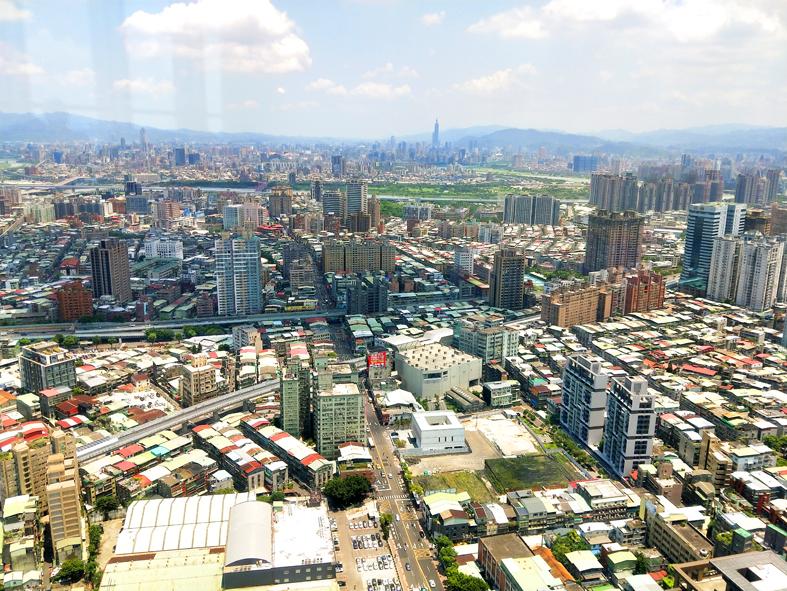Real-estate transactions in special municipalities last month increased 25 percent from last year, helped by a large amount of liquidity in the market, data released by the six cities showed.
Last month, Taipei, New Taipei City, Taoyuan, Taichung, Tainan and Kaohsiung had a total of 24,594 home, shop, office and factory transactions, up 25 percent from a year earlier and up 13 percent from October, the data showed.
Rising liquidity levels and low interest rates drove the booming property market, said Jessica Hsu (徐佳馨), head of the research department at real-estate agency H&B Business Group (住商不動產).

Photo: Ho Yu-hua, Taipei Times
The surge reflected a relatively low comparison base for the same period last year, Taiwan Realty Enterprise Group (台灣房屋集團) section head Charlene Chang (張旭嵐) added.
Some property developers began presales for new projects during the peak buying season, which also helped last month’s sales, she said, adding that presales especially helped sales in New Taipei City, Taoyuan, Taichung and Kaohsiung.
Taichung recorded the highest year-on-year growth at 53 percent, with 5,191 residential and commercial transactions, the data showed.
Taipei, the nation’s most closely watched property market, had 3,271 property transactions, up 37 percent from last year and up 21 percent from October.
New Taipei City had 6,047 property transactions (up 20 percent annually and 9 percent monthly), Taoyuan had 4,277 (up 9 percent annually and 23 percent monthly) and Tainan had 2,068 (up 13 percent annually and 11 percent monthly), while Kaohsiung had 3,740 property transactions (up 20 percent annually and 16 percent monthly), the data showed.

With an approval rating of just two percent, Peruvian President Dina Boluarte might be the world’s most unpopular leader, according to pollsters. Protests greeted her rise to power 29 months ago, and have marked her entire term — joined by assorted scandals, investigations, controversies and a surge in gang violence. The 63-year-old is the target of a dozen probes, including for her alleged failure to declare gifts of luxury jewels and watches, a scandal inevitably dubbed “Rolexgate.” She is also under the microscope for a two-week undeclared absence for nose surgery — which she insists was medical, not cosmetic — and is

CAUTIOUS RECOVERY: While the manufacturing sector returned to growth amid the US-China trade truce, firms remain wary as uncertainty clouds the outlook, the CIER said The local manufacturing sector returned to expansion last month, as the official purchasing managers’ index (PMI) rose 2.1 points to 51.0, driven by a temporary easing in US-China trade tensions, the Chung-Hua Institution for Economic Research (CIER, 中華經濟研究院) said yesterday. The PMI gauges the health of the manufacturing industry, with readings above 50 indicating expansion and those below 50 signaling contraction. “Firms are not as pessimistic as they were in April, but they remain far from optimistic,” CIER president Lien Hsien-ming (連賢明) said at a news conference. The full impact of US tariff decisions is unlikely to become clear until later this month

GROWING CONCERN: Some senior Trump administration officials opposed the UAE expansion over fears that another TSMC project could jeopardize its US investment Taiwan Semiconductor Manufacturing Co (TSMC, 台積電) is evaluating building an advanced production facility in the United Arab Emirates (UAE) and has discussed the possibility with officials in US President Donald Trump’s administration, people familiar with the matter said, in a potentially major bet on the Middle East that would only come to fruition with Washington’s approval. The company has had multiple meetings in the past few months with US Special Envoy to the Middle East Steve Witkoff and officials from MGX, an influential investment vehicle overseen by the UAE president’s brother, the people said. The conversations are a continuation of talks that

CHIP DUTIES: TSMC said it voiced its concerns to Washington about tariffs, telling the US commerce department that it wants ‘fair treatment’ to protect its competitiveness Taiwan Semiconductor Manufacturing Co (TSMC, 台積電) yesterday reiterated robust business prospects for this year as strong artificial intelligence (AI) chip demand from Nvidia Corp and other customers would absorb the impacts of US tariffs. “The impact of tariffs would be indirect, as the custom tax is the importers’ responsibility, not the exporters,” TSMC chairman and chief executive officer C.C. Wei (魏哲家) said at the chipmaker’s annual shareholders’ meeting in Hsinchu City. TSMC’s business could be affected if people become reluctant to buy electronics due to inflated prices, Wei said. In addition, the chipmaker has voiced its concern to the US Department of Commerce